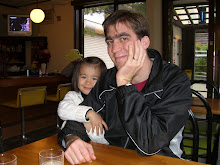We haven't really played or practiced Kaga style taiko since our recital on December 9th. Since the course we took only ran from August to December, and won't run again until August, we don't have many opportunities to play in this style. We did always want to visit the Ichikawa Juku School, though, which I mentioned in a post last fall.
Today (10.Feb) we finally were able to observe a practice there. Our intent was to observe, but we were immediately invited to participate in the practice. After all, they knew that we were not totally inexperienced, since nearly all of them took part in the December recital as well, and Ichikawa sensei also visited our Thursday night class on several occasions. We weren't sure how well we would be able to participate because we had both of our children with us, but the practice was fairly family freindly, allowing us to participate, and watch our kids at the same time.
When I wrote about the recital, I compared the atmosphere to a jazz club. The practice also seemed to have the same, laid back type of feeling. Soon after we arrived, they began warming up, which consisted of playing the mitsu uchi base rhythm (don doko don doko ...), followed by incorporating only a few Kaga taiko patterns. This probably didn't last any longer than 30 minutes. Then everyone had a break, drank some tea, smoked a cigarette, ate snacks, talked for a bit. Our kids found some sticks and played on the drums a little bit. During the break, Ichikawa sensei talked and played with our children. He told us that he has a grandchild the same age as our daughter (4.5 years).
Following the break, students came up one at a time, played a bit, and received guidance and commentary from Ichikawa sensei. It was rather like a 15 or 20 minute private lesson for each person, except that the rest of the class is watching you receive instruction. I can see that watching others play and listening to the critiques and suggestions from the teacher is an essential part of learning this particular style of taiko.
The warm up was pretty relaxed, and as I mentioned, Ichikawa sensei took on a kind and grandfatherly tone during the break as he played with our children. I was, therefore very surprised to hear his comments for the first student who played after the break. After she finished her piece, he basically said, "Well, if I were to tell you where you made mistakes, I would say everywhere. I would give you some positive feedback, but there was absolutely nothing postive about your playing." ... I thought "Wow," as I reached down to pick up my jaw off the floor. He then proceeded to work with her on various aspects of her playing, giving her advice and demonstrating at times, but his comments for most of the lesson with her were not very forgiving. Still, I noticed a significant improvement in her playing by the time she was finished.
Imagine my surpise (and horror) when he then said, "So, who's next? How about you, Brian san?" Seeing how he tore apart the previous student, who was much better than me, I could only imagine what he might say about my playing. Somewhat reluctantly, but trusting that he would be fairly kind to me, as it was my first visit to his class, I got up and played what I had played for the December recital, as best as I could remember. Being two months from that performance, of course, I made plenty of mistakes, but luckily, he was kind as I had hoped. His comments to me were basically, "You've made a good start, and if you practice, I'm sure you will become a good player." Next was my wife, and his comments to here were pretty much the same, except that he added, "I think you're just a tiny bit better than your husband." Well, I had thought that since we started practicing, so it wasn't a total surprise to to hear that.
The strictness and directness of the lesson suprised me mainly because the beginning of the class had been so laid back. I actually understood that this was just his teaching method, and not meant to be mean, but rather to motivate. The first student had been practicing Kaga taiko for some time and was fairly advanced. I'm sure he was simply trying to get her to play at a higher level, since she was probably capable of it. Although he mentioned several times, "Maybe you aren't as good as I thought you were, maybe I'm pushing you too fast." I think that anyone who has worked at something, be it an art or a sport, probably has noticed that the better you get, the more your teacher's seem to criticize you. As you improve, their expectations rise, and a good teacher will hold you to those.
If you are over-sensitive, or need positive comments along with the negative, you probably wouldn't last long in this class, but if you understand the purpose of the comments, and are able to not take them personally, you'll probably be fine. I think we are fine with that, and hope that we will be able to visit the school on a regular basis to continue learning Kaga style taiko during the "off season".
2008-02-10
Kaga Taiko - Ichikawa Juku School Visit
Labels:
Asano Taiko,
drums,
fukui,
Kaga style taiko,
komatsu,
Mitsu Uchi
Subscribe to:
Post Comments (Atom)




No comments:
Post a Comment